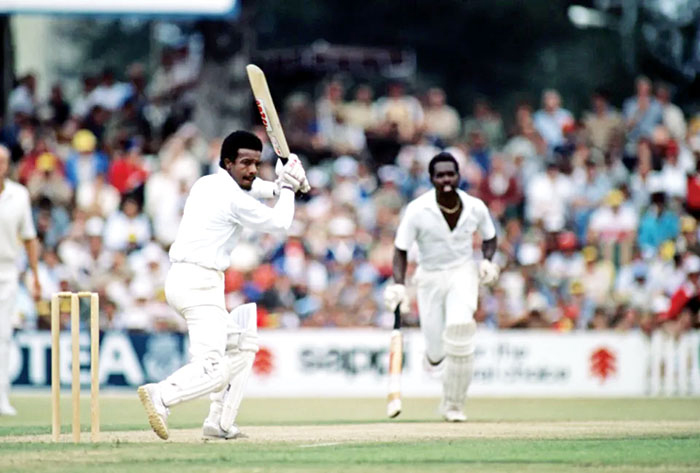Sports
David Murray, West Indies’ unforgiven wicketkeeper, dies aged 72

David Murray, the former West Indies wicketkeeper whose life and career was ruined by his fateful decision to join the rebel tours of South Africa in the 1980s, has died in his native Barbados at the age of 72.Murray, son of the legendary Sir Everton Weekes, played a total of 19 Tests and ten ODIs for West Indies between 1973 and 1982, and was hailed by the great fast bowlers of his era – Malcolm Marshall and Michael Holding among them – as the finest gloveman that they had played with.
It was Murray’s misfortune that his career ended up being bookended by two of the most legendary Caribbean wicketkeepers of them all – his namesake (but no relation) Deryck Murray, who kept him out of the Test team for much of his pomp, and then at the start of the 1980s, his younger rival Jeff Dujon, who once admitted that Murray’s silky skills made his own glovework look like “Dolly Parton”, but whose superior batting brooked no argument with the selectors.
Ultimately, however, Murray’s predilection for marijuana – a habit that he had begun aged 13 – was the catalyst for his downfall, first as an international cricketer and then, after his fateful decision to accept US$125,000 to tour Apartheid South Africa in the winter of 1983, as a member of society too. His final decades were spent in poverty in his native Barbados, selling drugs to tourists in Bridgetown, and trading on his infamy.
In the early part of his career, while the quality of his glovework was earning plaudits, and with the fast-tracking that came from being the son of a West Indies great, Murray had been adamant that his drug use was beneficial to his cricket. “It gives you good meditation… concentration you know,” he told ESPNcricinfo’s Siddhartha Vaidyanathan back in 2006. “Not that you did it to enhance your performance … never in the breaks – you can’t do that.”
Within the West Indies set-up, however, Murray could never shake the suspicion that his face did not fit, particularly while Deryck – Cambridge-educated and a key lieutenant to Clive Lloyd – was the favoured wicketkeeper. And when, after nearly a decade as the squad’s understudy, he did finally made his Test debut, against Australia in March 1978, it was due in large part to Deryck’s decision to join Kerry Packer’s World Series Cricket. It was a source of much frustration – and arguably a factor in his subsequent South Africa decision – that he lost his place again the following year, when the Packer players were reinstated.
In his brief time as the Test No.1, Murray still managed to score three half-centuries, with a best of 84 against India in Bombay in 1978-79, as well as a first-class double-hundred in Jamshedpur on the same tour.However, Murray had already been in trouble with the team management for his off-field antics, notably on the 1975-76 tour of Australia, when it took the intervention of Lance Gibbs to spare him an early flight home. And matters came to a head on West Indies’ return to Australia in 1981-82, where the emergence of Dujon gave the selectors a reason to dispense of a talented but increasingly erratic player.
Bad luck played a major part in Murray’s downfall, too. Early on the tour, he had broken his middle finger while attempting to catch a drive off Lloyd in the nets, but having played through the pain with supreme skill – taking a West Indies’ record nine catches in the first Test at Melbourne – he was rested for the subsequent one-dayers, allowing Dujon to make his case for a permanent berth with a match-winning fifty at the MCG.
Murray reacted badly to Dujon’s promotion. With his drug use now causing him to sleep through team meetings, he turned up for 12th-man duties at the subsequent Adelaide Test without his equipment, and was expelled from the tour by manager Steve Camacho after refusing to take the water cart onto the field.The die was cast for Murray’s recruitment on the South Africa rebel tour. The previous winter, a 12-man party of England cricketers, led by Graham Gooch, had flown into Johannesburg for a month-long tour that contravened the 1977 Gleneagles Agreement discouraging sporting relations with the Apartheid regime.
Compared to the mild censure (and swift forgiveness) that would come to the England players, however, the opprobrium heaped upon the West Indies tourists would be something else entirely. Murray’s tour fee, which he would quickly squander on “jeeps, new cars and partying out”, would be of no lasting benefit in the years to come.
“I f***ed up,” Murray told Ashley Gray, author of the award-winning Unforgiven, which recounted the tale of the West Indian rebels. His first on-field act in South Africa had been to take a catch off Sylvester Clarke in a tour match against Border, but that, as he told Gray, had been a crushing moment in itself. “Lawrence Rowe said to me as a joke, ‘You can’t play for West Indies anymore.’ Only one delivery. It felt bad.”
Murray’s personal life was upended by the South Africa decision, too. In the latter weeks of the Australian tour, he had married his fiancée Kerry McAteer in a private ceremony in Adelaide, but after initially being refused re-entry to the country due to a visa ban implemented by the anti-Apartheid prime minister, Malcolm Fraser, an ill-judged affair cemented his estrangement from his wife and new-born child, and left him rootless and ostracised back in his native Barbados.
He returned home to a “vibe” of rejection, Murray related in Unforgiven. “‘He sold his birthright’. They don’t forget. They are narrow-minded. I still cop it. ‘He is a traitor’. I have no regrets.”
His response was to turn to harder drugs, including cocaine, which in turn deepened his estrangement from his father, who feared he would steal from him to subsidise his habit. For the final decades of his life, Murray was skeletal-thin with matted dreadlocks framing his increasingly gaunt features.
Nevertheless, in 1989, the West Indies Cricket Board rescinded its lifetime ban on the South Africa rebels, and to the extent that forgiveness was achieved in the Caribbean, it was available in Barbados. One of Murray’s fellow rebels, Ezra Moseley, went on to play Test cricket – famously breaking Gooch’s hand in the Trinidad Test in 1990, while Murray’s own son, Ricky Hoyte, was Barbados wicketkeeper in the 1990s, and might have broken into the Test team too had he not shared some of his father’s wayward (if less self-destructive) traits.
Murray himself, however, remained a self-imposed outcast to the end.
(cricinfo)
Latest News
PSL 2025 to resume on May 17, final scheduled for May 25

PSL 2025 will resume on May 17, with the final on May 25. While there hasn’t yet been a public decision on the fixture list or venues, the announcement confirms the league will end a week after it was originally scheduled to.
This was announced on X (formerly Twitter) by PCB chairman Mohsin Naqvi. “HBL PSL X picks up from where it left off,” he wrote in the post. “6 teams, 0 fear. Get ready for 8 thrilling matches starting 17th May, leading up to the Grand Final on 25th May. Best of luck to all the teams!”
PCB is expected to announce further details shortly, and though Naqvi’s tweet did not officially confirm it, the remaining matches are expected to be played in Pakistan. The league, which was postponed due to increasing cross-border tensions with India, has eight games left and the PCB, as well as several franchises, have been eager to conclude the season as early as possible.
The PSL held meetings with the franchises on Monday to discuss specific dates and venues. The most pressing issue is the availability of overseas players, with ESPNcricinfo understanding a significant number are unlikely to return. The asymmetry of player availability may also impact squads, with some franchises more confident about overseas players rejoining than others. To mitigate that, PCB has also considered a replacement draft to make up the numbers.
This also confirms that Bangladesh’s tour of Pakistan will not stick to its original schedule. The final of the PSL takes place on the day Bangladesh were to play their first T20I against Pakistan, in Faisalabad. BCB has said it is in active and ongoing discussions about the tour.
(Cricinfo)
Latest News
Ahmedabad likely to host IPL 2025 final

While the Board of Control for Cricket in India (BCCI) has yet to officially announce the venues for the final and the first two playoffs – Qualifier 1 and the Eliminator – Cricbuzz understands that the Narendra Modi Stadium in Ahmedabad has been shortlisted to host Qualifier 2 and the final, scheduled for June 1 and 3 respectively.
The IPL is resuming on May 17 and it will have 17 games post break. Six centres – Mumbai, Lucknow, Ahmedabad, Delhi, Jaipur – will be hosting the games.
Sports
Police investigating death of Cricket Malawi operations director Arjun Menon

Arjun Menon, Cricket Malawi’s operations director, has died aged 48. Police are reported to be investigating the circumstances of his death in Blantyre, Malawi’s financial and commercial capital, on Sunday.
Menon played for Singapore and held coaching roles with various international teams including Chile, Botswana, Indonesia and Singapore before taking on the Malawi role in 2020.
“As Cricket Malawi, we are devastated by this loss because Arjun did so much to our transformative agenda,” Vivek Ganesan, the president of Cricket Malawi, told Nation Online. “All the successes we have so far are attributed to him. This is a very painful loss.”
Dr. Henry Kamata, CEO of the Malawi National Council of Sports, also conveyed his condolences in a statement. “Arjun was a dedicated coach and a passionate advocate for the development of cricket in Malawi,” he said. “His contributions to the sport were immense and far-reaching, playing a pivotal role in the growth and success of the Malawi cricket team on regional and international platforms.
“His commitment, professionalism, and vision were truly inspirational, and his loss is a devastating blow to the sporting fraternity in Malawi and beyond.”
During Menon’s tenure, the Malawi men’s team were runners-up behind Tanzania in Group A of the T20 World Cub Sub Regional Africa Qualifier in September 2024. The Under-19 women’s team, meanwhile, topped Division 2 of the 2025 Under-19 Women’s T20 World Cup Africa Qualifier, gaining entry to Division 1 where they achieved a seventh-place finish.
[Cricinfo]
-

 Latest News6 days ago
Latest News6 days agoNPP win Maharagama Urban Council
-

 Features3 days ago
Features3 days agoSAITM Graduates Overcome Adversity, Excel Despite Challenges
-

 Business6 days ago
Business6 days agoJohn Keells Properties and MullenLowe unveil “Minutes Away”
-

 Sports3 days ago
Sports3 days agoASBC Asian U22 and Youth Boxing Championships from Monday
-

 News3 days ago
News3 days agoDestined to be pope:Brother says Leo XIV always wanted to be a priest
-

 Foreign News4 days ago
Foreign News4 days agoMexico sues Google over ‘Gulf of America’ name change
-

 Opinion6 days ago
Opinion6 days agoRatmalana: An international airport without modern navigational and landing aids
-

 Opinion3 days ago
Opinion3 days agoDrs. Navaratnam’s consultation fee three rupees NOT Rs. 300












